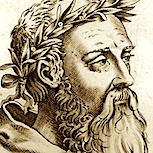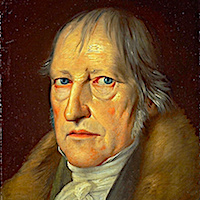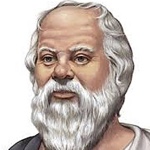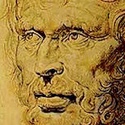

Tao Te Ching

Heraclitus Ἡράκλειτος
(of Ephesus, the "Weeping Philosopher")
535 – 475 BCE
A Greek Buddha
Lonely, self-taught wisdom pioneer who like the Buddha abdicated his inherited kingship; Heraclitus also like the Buddha stressed the ever-present quality of impermanence and change, the importance of humans waking up from unconsciousness, and the unity of opposites. Devoted to the principle of inscrutability, he was known as "the Obscure" and wrote only for the wise and not “the rabble.” Born just 28 years after the Buddha, he emphasized the central Buddhist doctrine of impermanence and is famous for his quote, "No man ever steps in the same river twice.” Also contemporary with Lao Tzu, he mirrored the teaching of yin and yang regarding the soul as being a mixture of fire and water, light and dark.
Eras
Western
Egyptian Civilization (3150 – 305 BCE)Greek Civilization (480 – 146 BCE)
The Axial Age, “The Great Leap of Being” (800 – 200 BCE)
Chinese
Eastern Zhou 東周 (770 – 256 BCE)Spring and Autumn period 春秋时代 (770 – 476 BCE)
Warring States period 春秋时代 (476 – 221 BCE)
Sources
Unlisted Sources
Quotes by Heraclitus (21 quotes)
“Everything changes and nothing remains still.”
Chapters:
21. Following Empty Heart
Comments: Click to comment
“the path up and down are one and the same”
Chapters:
77. Stringing a Bow
Comments: Click to comment
“Into the same river no man can step twice; for fresh waters are ever flowing in upon you.”
Comments: 1 comment
“All things come out of the one, and the one out of all things.”
Comments: Click to comment
“Mortals are immortals, and immortals are mortals, the one living the other's death and dying the other's life.”
Comments: Click to comment
“God is day and night, winter and summer, war and peace, surfeit and hunger; but he takes various shapes, just as fire, when it is mingled with spices, is named according to the savor of each.”
Comments: Click to comment
“We must know that war is common to all and strife is justice, and that all things come into being and pass away through strife.”
Comments: Click to comment
“Men do not know how what is at variance agrees with itself. It is an attunement of opposite tensions, like that of the bow and the lyre.”
Comments: Click to comment
“For men to get all they wish is not the better thing; it is disease that makes health pleasant; evil, good; hunger, surfeit; toil rest”
Comments: Click to comment
“Good and bad are the same; goodness and badness are one.”
Comments: Click to comment
“The struggle against desire is difficult, because it must be purchased at the soul's expense.”
Comments: Click to comment
“This world has always been, is, and always shall be: an everlasting fire rhythmically dying and flaring up again.”
Comments: Click to comment
“When Homer said that he wished war might disappear from the lives of gods and men, he forgot that without opposition all things would cease to exist.”
Comments: Click to comment
“No matter how many ways you try, you cannot find a boundary to consciousness, so deep in every direction does it extend.”
Comments: Click to comment
“Opposites cooperate. The most beautiful harmonies come from opposition.”
Comments: Click to comment
“The laws of men derive from the divine law, which is whole and single, which penetrates as it will to satisfy human purposes, but is mightier than any law know to men.”
Comments: Click to comment
“Good character is not formed in a week or a month. It is created little by little, day by day. Protracted and patient effort is needed to develop good character.”
Comments: Click to comment
“Man, who is an organic continuation of the Logos, thinks he can sever that continuity and exist apart from it.”
Comments: Click to comment
“To live is to die, to be awake is to sleep, to be young is to be old, for the one flows into the other, and the process is capable of being reversed.”
Comments: Click to comment
Quotes about Heraclitus (6 quotes)

“All in all, the philosophy of Heraclitus is among the major products of the Greek mind... he illuminates all life and conduct... the unity of opposites revived vigorously in Hegel, the idea of change came back into its own with Bergson, the conception of strife and struggle as determining all things reappears in Darwin, Spencer, and Nietzsche”
Comments: Click to comment

“[With Heraclitus] we see land; there is no proposition of Heraclitus which I have not adopted in my Logic.”
Comments: Click to comment

“The doctrine of the perpetual flux, as taught by Heraclitus, is painful, and science can do nothing to refute it.”
Comments: Click to comment

“There is no need to yearn, envy, and grab... Diogenes and Heraclitus were impeccable models of living by such principles rather than by raw impulse.”
Comments: Click to comment

“The part I understand is excellent, and so too is, I dare say, the part I do not understand; but it needs a Delian diver to get to the bottom of it.”
Comments: Click to comment

“To say, as Heraclitus does, that everything is fire, and nothing can be numbered among things as a reality except fire, seems utterly crazy. This strikes me as not only pointless but mad.”
Comments: Click to comment
Comments (0)